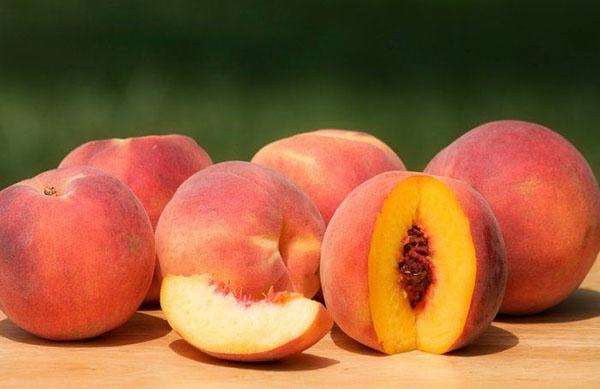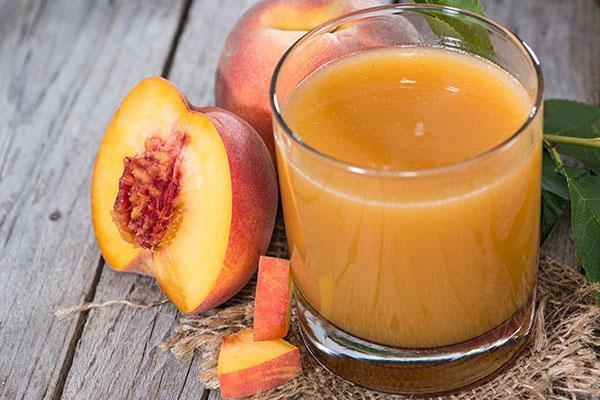Health benefits and harms of peaches
 There are many people who wholeheartedly love peaches, the benefits and harms of which are of interest to everyone who looks after their health. Juicy velvety fruits native to China have long been grown not only in this region of Asia, but also around the world. They are famous for their tender, melting flesh, sweet taste and amazing aroma. Moreover, as they ripen, peaches, in addition to sugars, accumulate a lot of nutrients, becoming a valuable dietary product.
There are many people who wholeheartedly love peaches, the benefits and harms of which are of interest to everyone who looks after their health. Juicy velvety fruits native to China have long been grown not only in this region of Asia, but also around the world. They are famous for their tender, melting flesh, sweet taste and amazing aroma. Moreover, as they ripen, peaches, in addition to sugars, accumulate a lot of nutrients, becoming a valuable dietary product.
Why is a peach good for you? What minerals and vitamins does the body receive if these fruits are regularly included in the diet?
Nutritional value and calorie content of peaches

From stone fruit crops, peaches gain sweetness better than others. In the sunny, fine-fibred pulp, up to 9-12% of sugar and less than a percentage of acids accumulate over the summer.
This combination attracts both wasps hunting for delicacies and gourmets of all ages. Only 100 grams of fruit contains:
- about 1 gram of proteins;
- negligible amount of fat;
- 9.5 grams of carbohydrates;
- 0.5-1 gram of organic acids;
- 2.1 grams of fiber;
- 0.6 grams of ash;
- 86 grams of moisture.
 The calorie content of peaches per 100 grams is only 45 kcal. The fruits contain ascorbic acid and beta carotene, vitamins B and biotin, niacin, vitamins E and PP. Among the macronutrients that this type of stone fruit is rich in are phosphorus and sodium, potassium and calcium, magnesium, sulfur and silicon. The list of trace elements includes iron and zinc, copper and aluminum, iodine and fluorine. Such a wide range of bioactive compounds predetermines the benefits of peaches and the harm that is not excluded if used carelessly.
The calorie content of peaches per 100 grams is only 45 kcal. The fruits contain ascorbic acid and beta carotene, vitamins B and biotin, niacin, vitamins E and PP. Among the macronutrients that this type of stone fruit is rich in are phosphorus and sodium, potassium and calcium, magnesium, sulfur and silicon. The list of trace elements includes iron and zinc, copper and aluminum, iodine and fluorine. Such a wide range of bioactive compounds predetermines the benefits of peaches and the harm that is not excluded if used carelessly.
Benefits of peaches for the heart and circulatory system
 Due to the content of potassium, magnesium and a lot of vitamins, the pulp of ripe fruits will help strengthen the heart, large vessels and capillaries. Moderate consumption peaches warns:
Due to the content of potassium, magnesium and a lot of vitamins, the pulp of ripe fruits will help strengthen the heart, large vessels and capillaries. Moderate consumption peaches warns:
- blood clots;
- accumulation of harmful cholesterol and its deposition on the walls of blood vessels;
- diseases associated with irregular heart rhythm.
The high concentration of vitamin E means that the fruit is able to stimulate tissue renewal. In addition, the benefits of iron-rich peaches are evident in anemia, nervous exhaustion, stress and chronic fatigue.
How are peaches good for digestion?
 The dietary fiber contained in the pulp of peaches, as well as the velvety bristle skin, stimulates the digestive processes. Contrary to common misconceptions, villi cannot cause intestinal upset. Subject to safety standards, the fruits:
The dietary fiber contained in the pulp of peaches, as well as the velvety bristle skin, stimulates the digestive processes. Contrary to common misconceptions, villi cannot cause intestinal upset. Subject to safety standards, the fruits:
- support healthy peristalsis;
- promote the digestion of food;
- improve the absorption of nutrients;
- help the timely removal of toxins and toxins.
The cleansing properties of peaches extend beyond the gastrointestinal tract. The fruits have a pronounced choleretic and diuretic effect. A fresh dessert made from sunny fruits will help eliminate puffiness, remove excess fluid and maintain blood pressure levels in a natural way.
Knowing about the diuretic ability and how many calories are in a peach, it can be argued that the fruit can be included in the menu of those who want to lose weight or maintain weight.
Peaches for bone health and skin beauty
 Organic acids, calcium and phosphorus strengthen bones, accelerate regeneration and improve their structure.The same goes for tissue health and rejuvenation.
Organic acids, calcium and phosphorus strengthen bones, accelerate regeneration and improve their structure.The same goes for tissue health and rejuvenation.
Obviously, the benefits of peaches during pregnancy, adolescence and the elderly will be maximized. The main thing is to know when to stop, avoiding excesses.
In small quantities, but regularly, the fruits are recommended for arthritis, osteochondrosis, osteoporosis and signs of rheumatism. In this case, the strengthening effect is combined with a cleansing effect. Thanks to fruits, salts, excess moisture and toxins leave the body without delay.
Fruit acids, minerals and vitamins of peaches have a beneficial effect not only on the state of tissues and internal organs. External use gives the skin:
- active mitigation;
- moisturizing;
- cleansing from excess skin secretions, grease and dust;
- food.
The almost complete absence of harm and the benefits of peaches for the most delicate skin have long been appreciated by cosmetologists. Acting in a complex manner, for example, as part of a mask, juicy pulp gradually relieves inflammation, smoothes wrinkles, brightens and evens out the complexion.
Fortifying effect of peaches
 Peaches are an excellent source of vitamins, mineral acids and other substances that a person needs for good health, vitality and health. Among other things, sweet summer fruits:
Peaches are an excellent source of vitamins, mineral acids and other substances that a person needs for good health, vitality and health. Among other things, sweet summer fruits:
- strengthen the immune system, helping to resist stress and seasonal colds;
- accelerate recovery and recovery from illness;
- increase efficiency and memory;
- work as antioxidants, allowing you to prolong youth.
There are obvious benefits of peaches in pregnancy and other mood swings. Fruits containing sugar, potassium, magnesium, mineral salts and acids, balance the psyche, set in a positive mood.
Peaches during pregnancy and breastfeeding
 If a peaches are intended for a woman expecting a baby, you need to make sure that the fruits do not cause an allergic reaction. Can peaches be breastfed? As in pregnancy, the inclusion of southern fruits in the diet should be taken with caution, especially if this product has not previously been included in the usual diet.
If a peaches are intended for a woman expecting a baby, you need to make sure that the fruits do not cause an allergic reaction. Can peaches be breastfed? As in pregnancy, the inclusion of southern fruits in the diet should be taken with caution, especially if this product has not previously been included in the usual diet.
Two or three fruits a day will not cause harm, and the benefits of peaches will be expressed in relieving symptoms of morning sickness. Juicy ruddy fruits will help maintain hemoglobin levels, prevent vitamin deficiency and improve mood.
Contraindications to the use of peaches
Despite the abundance of beneficial properties, peach can be harmful to health. This happens with careless and excessive use. The high concentration of sugar makes the fruit not too desirable for diabetics. People who are prone to allergies should also treat fruits with care.
Patients with gastritis with high acidity, a tendency to diarrhea or suffering from dyspepsia fall into the risk category. Excessive passion for velvety fruits can cause frustration and deterioration with exacerbation of chronic ailments of the digestive tract.